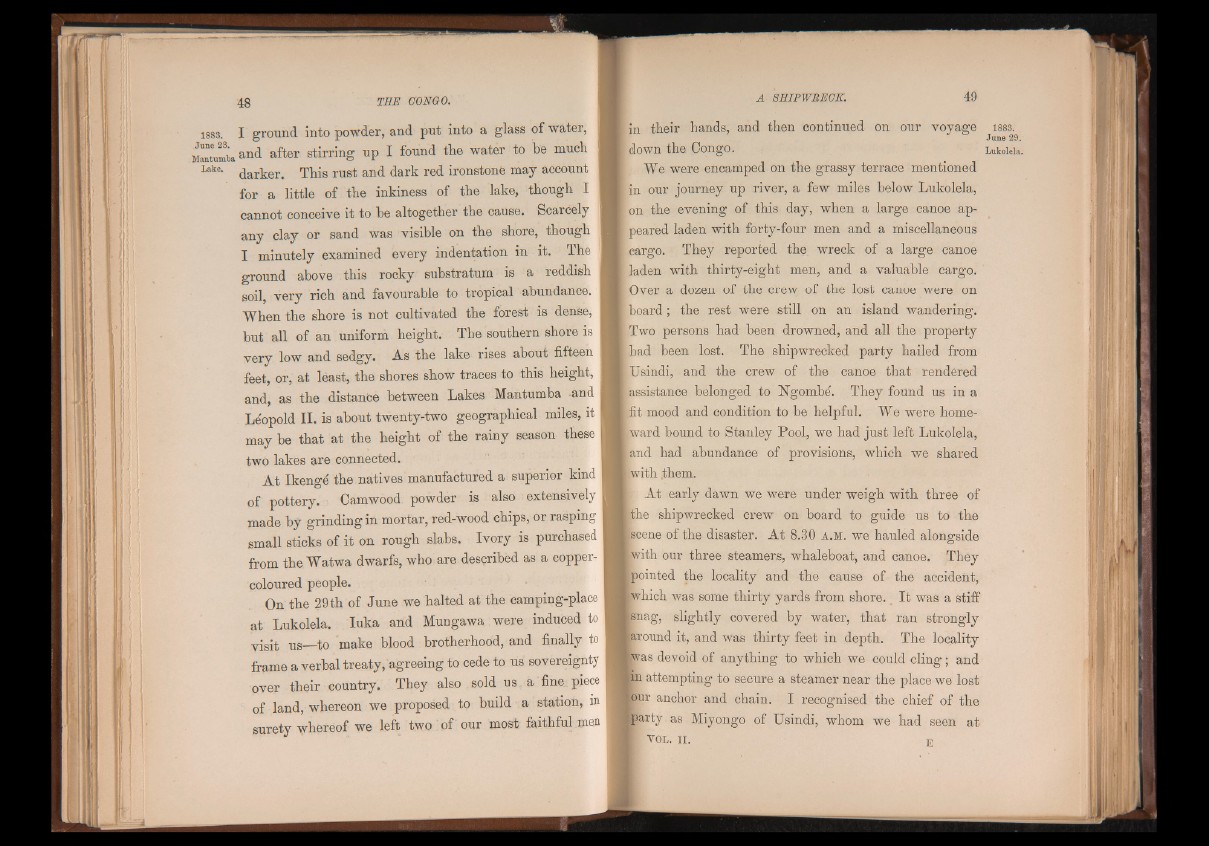
1883. I ground into powder, and put into a glass of water,
Mantumba and after stirring up I found tlie water to be much
Uie‘ darker. This rust and dark red ironstone may account
for a little of the inkiness of the lake, though I
cannot conceive it to be altogether the cause. Scarcely
any clay or sand was visible on the shore, though
I minutely examined every indentation in it. The
ground above this rocky substratum is a reddish
soil, very rich and favourable to tropical abundance.
When the shore is not cultivated the forest is dense,
but all of an uniform height. The southern shore is
very low and sedgy. As the lake rises about fifteen
feet, or, at least, the shores show traces to this height,
and, as the distance between Lakes Mantumba -and
Leopold II. is about twenty-two geographical miles, it
may be that at the height of the rainy season these
two lakes are connected.
At Ikenge the natives manufactured a superior kind
of pottery. Camwood powder is also extensively
made by grinding in mortar, red-wood chips, or rasping
small sticks of it on rough slabs. Ivory is purchased
from the Watwa dwarfs, who are described as a coppercoloured
people.
On the 29th of June we halted at the camping-place
at Lukolela. Iuka and Mungawa were induced to
visit us—to make blood brotherhood, and finally to
f r a m e a verbal treaty, agreeing to cede to us sovereignty
over their country. They also sold us , a fine piece
of land, whereon we proposed to build a station, in
surety whereof we left two of our most faithful men
in their hands, and then continued on our voyage
down the Congo.
We were encamped on the grassy terrace mentioned
| in our journey up river, a few miles below Lukolela,
ion the evening of this day, when a large canoe ap-
: peared laden with forty-four men and a miscellaneous
cargo. They reported the wreck of a large canoe
laden with thirty-eight men, and a valuable cargo.
Over a dozen of the crew; of the lost canoe were on
board; the rest were still on an island wandering.
Two persons had been drowned, and all the property
[had been lost. The shipwrecked party hailed from
lUsindi, and the crew of the canoe that rendered
¡ assistance belonged to Ngom.be. They found us in a
|fit mood and condition to be helpful. We were home-
iward bound to Stanley Pool, we had just left Lukolela,
land had abundance of provisions, which we shared
liwith .them.
■ At early dawn we were under weigh with three of
ithe shipwrecked crew on board to guide us to the
■scene of the disaster. At 8.30 a .m . we hauled alongside
►with our three steamers, whaleboat, and canoe. They
pointed the locality and the cause of the accident,
[which was some thirty yards from shore. - It was a stiff
¡snag, slightly covered by water, that ran strongly
¿around it, and was thirty feet in depth. The locality
Iwas devoid of anything to which we could cling; and
in attempting to secure a steamer near the place we lost
¡our anchor and chain. I recognised the chief of the
party as Miyongo of Usindi, whom we had seen at
I VOL. II. E
1883.
June 29.
Lukolela.